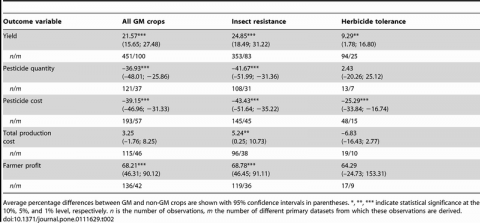
Despite the rapid adoption of genetically modified (GM) crops by farmers in scientifically advancedc countries, controversies about the 1970s version of genetic engineering (successfully used commonly since the 1990s) continue. For every victory of the Rainbow Papaya in Hawaii, environmentalists insist dozens of times there is uncertainty and that only older genetic engineering like mutagenesis - mutating seeds with chemicals and radiation - should be allowed.
Well-funded publicity campaigns against science always win, and it is no different in food. They even argue crop yields are identical with the manufacturing process favored by their corporation donors, Organic Food.
To try and get a real understanding of one aspect of the debate, whether or not GMOS reduce pesticides while increasing yields, researchers conducted a meta-analysis of the agronomic and economic impacts of GM crops. Original studies for inclusion were identified through keyword searches in ISI Web of Knowledge, Google Scholar, EconLit, and AgEcon Search.
Studies were included when they build on primary data from farm surveys or field trials anywhere in the world, and when they report impacts of GM soybean, maize, or cotton on crop yields, pesticide use, and/or farmer profits.
147 original studies were included and they did analysis of mean impacts and meta-regressions to examine factors that influence outcomes.
Results
On average, GM technology adoption has reduced chemical pesticide use by 37%, increased crop yields by 22%, and increased farmer profits by 68%. Yield gains and pesticide reductions are larger for insect-resistant crops than for herbicide-tolerant crops. Yield and profit gains are higher in developing countries than in developed countries.
Anti-science activists will note limitation of this the way they never do if organic trade group economist Chuck Benbrook claims strawberries "feel" better in the mouth - some of the studies did not report sample sizes and measures of variance, which makes an analysis of their analysis difficult.
Yet overwhelmingly, the meta-analysis reveals robust evidence of GM crop benefits for farmers in developed and developing countries. On average, GM technology has increased crop yields by 21%. These yield increases are not due to higher genetic yield potential, but to more effective pest control and thus lower crop damage. At the same time, GM crops have reduced pesticide quantity by 37% and pesticide cost by 39%. The effect on the cost of production is not significant. GM seeds are more expensive than non-GM seeds, but the additional seed costs are compensated through savings in chemical and mechanical pest control. Average profit gains for GM-adopting farmers are 69%.

Though consumers also gain much from lower food prices, the big benefit is for farmers. GMOs can be a key economic advantage for small farmers who want to compete locally versus much larger operations - and in Africa, GMOs would allow them to overcome the subsidies countries like France use to make sure that continent controls their food supply.